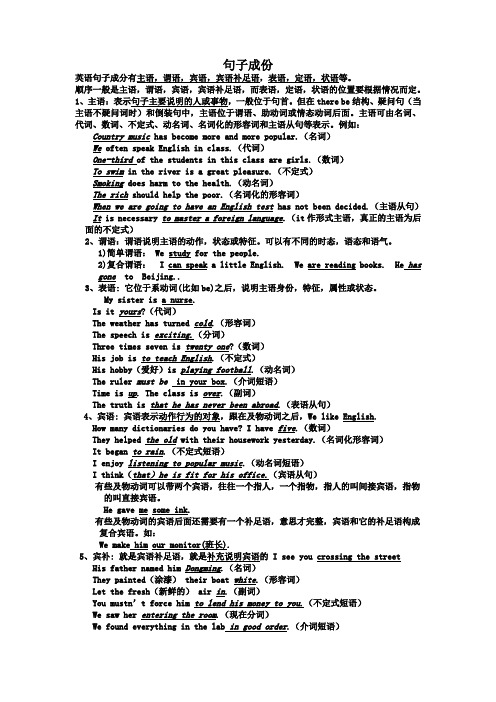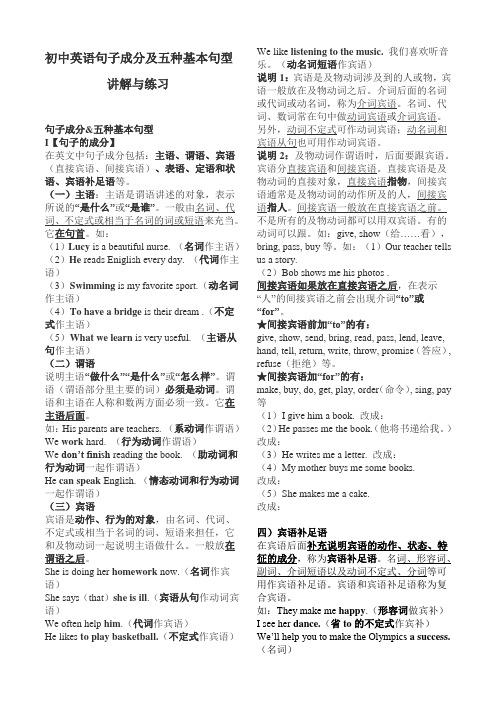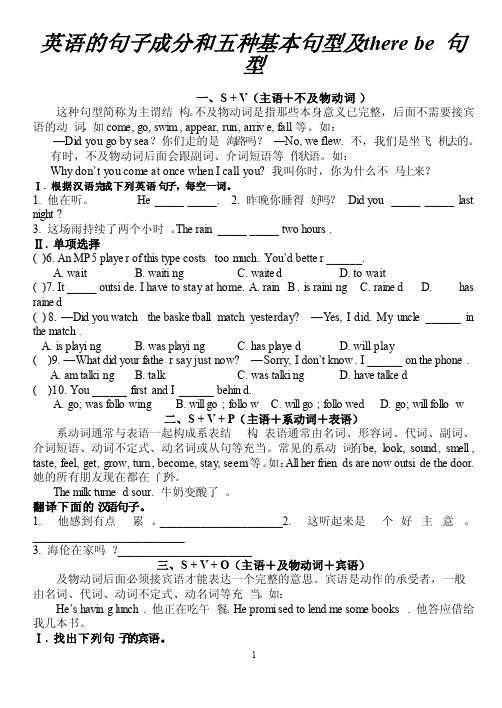五种基本句型和句子成分
英语句子成分和五种基本句型

句子成份英语句子成分有主语,谓语,宾语,宾语补足语,表语,定语,状语等。
顺序一般是主语,谓语,宾语,宾语补足语,而表语,定语,状语的位置要根据情况而定。
1、主语:表示句子主要说明的人或事物,一般位于句首。
但在there be结构、疑问句(当主语不疑问词时)和倒装句中,主语位于谓语、助动词或情态动词后面。
主语可由名词、代词、数词、不定式、动名词、名词化的形容词和主语从句等表示。
例如:Country music has become more and more popular.(名词)We often speak English in class.(代词)One-third of the students in this class are girls.(数词)To swim in the river is a great pleasure.(不定式)Smoking does harm to the health.(动名词)The rich should help the poor.(名词化的形容词)When we are going to have an English test has not been decided.(主语从句)It is necessary to master a foreign language.(it作形式主语,真正的主语为后面的不定式)2、谓语:谓语说明主语的动作,状态或特征。
可以有不同的时态,语态和语气。
1)简单谓语: We study for the people.2)复合谓语: I can speak a little English. We are reading books. He hasgone to Beijing..3、表语: 它位于系动词(比如be)之后,说明主语身份,特征,属性或状态。
My sister is a nurse.Is it yours?(代词)The weather has turned cold.(形容词)The speech is exciting.(分词)Three times seven is twenty one?(数词)His job is to teach English.(不定式)His hobby(爱好)is playing football.(动名词)The ruler must be in your box.(介词短语)Time is up. The class is over.(副词)The truth is that he has never been abroad.(表语从句)4、宾语: 宾语表示动作行为的对象,跟在及物动词之后,We like English.How many dictionaries do you have? I have five.(数词)They helped the old with their housework yesterday.(名词化形容词)It began to rain.(不定式短语)I enjoy listening to popular music.(动名词短语)I think(that)he is fit for his office.(宾语从句)有些及物动词可以带两个宾语,往往一个指人,一个指物,指人的叫间接宾语,指物的叫直接宾语。
英语句子成分及五种基本句型

1. This is an English-Chinese dictionary. 这是本英汉辞典。
2. The dinner smells good.
午餐的气味很好。
3. Everything looks different.
一切看来都不同了。
4. He is growing tall and strong. 他长得又高又壮
什么可以作谓语?
We love China. We have finished reading this book. He can speak English.
及物动词 vt
My mother usually gets up early. The boy often plays in his yard. 不及物动词 vi
基本句型3: 主+谓+宾
例句 他时常弹吉他。 A
例句B 我想喝杯茶。
例句C 我不知道什么时候离开这儿。
例句 我承认伤害了你。 D
Tip 1
某些特定的动词习惯于用动词不定式作为其宾语,如: attempt,decide,expect,hope,learn,need, pretend,promise,refuse,want,wish等
I’d like to have some coffee.
动词不定式
I enjoy working with you.
动名词
I think you are right.
宾语从句及复合宾语
I really don’t know what to do next.
思考: 一个句子中若可以存在宾语,其谓语动词应该具备 什么特点呢?
基本句型3: 主+谓+宾
5种简单句基本句型及句子成分名词解释

5种简单句基本句型及句子成分名词解释前五个句型属于简单句的基本句型,后面三个是中考中重要的简单句句型,最后面是句子成分的名词解释。
一. 五种简单句基本句型1.“主语+ 谓语”(即“主谓”句型)这一句型英汉语言结构形式完全相同,说明“某人或某物如何动作”,或者说“某人或某物自身怎样运动”。
例:They arrived in Harbin yesterday morning.分析:“they”(主语)“arrived”(谓语)。
2.“主语+ 谓语+ 宾语”(即“主谓宾”句型)这一句型英汉语言的结构形式完全相同,用以说明“某人或某物做什么事情”,或者说“某人或某物发出了动作,并且其动作涉及到另一个人或物”。
例:I study English.分析:“I”(主语)“study”(谓语动作)“English”(宾语即动作涉及的对象)。
3.“主语+ 谓语+ 间接宾语+ 直接宾语”(即“主谓双宾”句型)这一句型英汉语序结构相同,说明“某人为谁(间接宾语为人)做某事”,或者说“某人或物的运动涉及到两个对象,其中一个间接对象为人,另一个为物”。
例:Our teacher taught us English.分析:“our teacher”(主语)“教”(谓语动作)“us”(间接宾语)“English”(直接宾语)。
4.“主语+ 谓语+ 宾语+ 宾语补足语”(即“主谓宾宾补”句型)这一句型说明“某人或某物要求(使、让)某人做什么”或“某人感觉某人或物怎么样”。
例:He asked her to go there.分析:“he”(主语)“asked”(谓语动作)“her”(宾语即动作涉及的对象)“to go there”(补语—补充说明宾语做什么)。
5.“主语+ 系动词+ 表语”(即“主系表”句型)这一句型用以说明“某人(某物、某事、某种概念)具有什么特征或处于什么状态”。
汉语的“是”字结构属于这一英语句型的形式之一。
英语句子成分和五种基本句型

以上两个句型可以互换: He gave me a pen.=He gave a pen to me. He will buy me some books.=he will buy some books for me. She made me a cake.=she made a cake for me. 4. “疑问词+不定式”作直宾 He taught me how to read the word. She asked me which way to go. I told him what to do. He asked me why to sing this song.
宾语补足语
在英语中,有些句子里只有宾语并不能表达
完整的意思,还必须在宾语后面加上宾语补 足语才能表达完整的意思。我们把“宾语+宾 语补足语”称为复合宾语。名词、形容词、 副词、介词短语、不定式、现在分词、过去 分词都可以做宾语补足语。通常位于宾语之 后。
If
you let me go, I will make you king. Leave the door open. We found Li Ming out when we arrived. Make yourself at home. The manager asked him to wait. I saw her enter the shopping mall. The boss kept him working all day. Yesterday he got his leg broken.
状语
状语用来修饰动词、形容词或副词。一般表示行
为发生的时间、地点、目的、方式、程度等意义, 常由副词、介词短语、不定式、句子或相当于副 词的词或短语来表示。一般放在句末,有时可以 放在句首、句中。 He did it carefully. Without his help, we couldn’t work it out. (In order) to catch up with my classmates, I must study hard. Just as I was leaving, the phone rang again.
句子成分类型及五大基本句型

初中英语句子成分及五种基本句型讲解与练习句子成分&五种基本句型I【句子的成分】在英文中句子成分包括:主语、谓语、宾语(直接宾语、间接宾语)、表语、定语和状语、宾语补足语等。
(一)主语:主语是谓语讲述的对象,表示所说的“是什么”或“是谁”。
一般由名词、代词、不定式或相当于名词的词或短语来充当。
它在句首。
如:(1)Lucy is a beautiful nurse. (名词作主语)(2)He reads Eniglish every day. (代词作主语)(3)Swimming is my favorite sport.(动名词作主语)(4)To have a bridge is their dream .(不定式作主语)(5)What we learn is very useful. (主语从句作主语)(二)谓语说明主语“做什么”“是什么”或“怎么样”。
谓语(谓语部分里主要的词)必须是动词。
谓语和主语在人称和数两方面必须一致。
它在主语后面。
如:His parents are teachers. (系动词作谓语)We work hard. (行为动词作谓语)We don’t finish reading the book. (助动词和行为动词一起作谓语)He can speak English. (情态动词和行为动词一起作谓语)(三)宾语宾语是动作、行为的对象,由名词、代词、不定式或相当于名词的词、短语来担任,它和及物动词一起说明主语做什么。
一般放在谓语之后。
She is doing her homework now.(名词作宾语)She says(that)she is ill.(宾语从句作动词宾语)We often help him.(代词作宾语)He likes to play basketball.(不定式作宾语)We like listening to the music.我们喜欢听音乐。
句子成分和五种基本句型

句子的成分表
类 句中 别 成分 主 主语 要 成 分 谓语 次 表语 要 成 分 宾语 语法意义 例句
句子的主体, 句子的主体,说明 We can speak a little 所说的是“ 所说的是“谁”或 English. 什么” 是“什么” The book is mine. 表示主语的动作, 表示主语的动作, We love our country. 特征或状态 He is watching TV. 位于连系动词之后, 位于连系动词之后,We are busy today. 说明主语的身份、 说明主语的身份、 Knowledge is very important. 特征、 特征、属性或状态 表示动作的对象或 She is reading a book. 行为的承受者 I killed him.
Sb do
1. The sun│rose. │ 2. They │are talking.
基本句型 二
S +V +P(主+系+表) P(主
此句型的句子有一个共同的特点: 此句型的句子有一个共同的特点:句子谓语 动词都不能表达一个完整的意思, 动词都不能表达一个完整的意思,必须加上一个 表明主语身份或状态的表语构成复合谓语, 表明主语身份或状态的表语构成复合谓语,才能 表达完整的意思。这类动词叫做连系动词。 表达完整的意思。这类动词叫做连系动词。
• 说明:有些系动词同时也是实义动词,该动词 说明:有些系动词同时也是实义动词, 表达实义时,有词义,可单独作谓语, 表达实义时,有词义,可单独作谓语, • 例如: 例如: • He fell ill yesterday. 他昨天病了。(fell是 他昨天病了。 是 系动词,后跟补足语,说明主语情况。) 系动词,后跟补足语,说明主语情况。 • He fell off the ladder. 他从梯子上摔下来。 他从梯子上摔下来。 (fell是实义动词,单独作谓语。) 是实义动词, 是实义动词 单独作谓语。 • The soft drinking tastes quite sour. (taste作系动词,不能使用进行时,后 作系动词, 作系动词 不能使用进行时, 面接形容词。 面接形容词。) • The chef is tasting the fish carefully. (作 作 实意动词,使用进行时,并后接副词做状语) 实意动词,使用进行时,并后接副词做状语
英语的句子成分和五种基本句型及therebe句型

英语的句子成分和五种基本句型及t herebe 句型一、S + V(主语+不及物动词)这种句型简称为主谓结构。
不及物动词是指那些本身意义已完整,后面不需要接宾语的动词,如come, go, swim, appear, run, arrive, fall等。
如:—Did you go by sea?你们走的是海路吗?—No, we flew. 不,我们是坐飞机去的。
有时,不及物动词后面会跟副词、介词短语等作状语。
如:Whydon’tyoucome at once when I call you? 我叫你时,你为什么不马上来?Ⅰ. 根据汉语完成下列英语句子,每空一词。
1. 他在听。
He __________.2. 昨晚你睡得好吗?Did you __________last night?3. 这场雨持续了两个小时。
The rain __________two hours.Ⅱ. 单项选择( )6. An MP5 player of this type coststoo much. You’dbetter ______.A. waitB. waitin gC. waitedD. to wait( )7. It _____outsid e. I have to stay at home. A. rain B. is rainin g C. rained D. has rained( )8. —Did you watchthe basket ballmatchyester day? —Y es, I did. My uncle______in the match.A. is playin gB. was playin gC. has playedD. will play( )9. —What did your father say just now? —Sorry,Idon’tknow. I ______ on the phone.A. am talkin gB. talkC. was talkin gD. have talked( )10. You ______ firstand I ______ behind.A. go; was follow ingB. will go; followC. will go; follow edD. go; will follow二、S + V + P(主语+系动词+表语)系动词通常与表语一起构成系表结构。
基本句型与句子成分

五大基本句型与句子成分英语句子长短不一,有简有繁,表面上看,变化万千,但分析其实质,却可发现共同的规律:这些变化万千的句子,从其结构来看,都符合五种基本句型。
1. 主语+ 系动词+ 表语例句:He is very happy. 他很高兴。
注解:is 为连系动词,没有具体动作,只是起连接主语(He)和后边成分(very happy)的作用,系动词后面所接的成分是用来说明主语的特点,表明主语的性质特征,因此我们把系动词后面的成分叫做主语补足语,也叫做表语。
系动词的主要分类:1)状态系动词:be2)持续系动词:keep, remain, stay, lie, stand3)表像系动词:seem, appear, look4)感官系动词:feel, smell, sound, taste,5)变化系动词:become, grow, turn, fall, get, go, come, run.6)终止系动词:prove, turn out, 表达"证实","结果…"2. 主语+ 谓语(+ 状语:表明时间、地点、方式、原因等)例句:They differ widely in the taste. 他们的品味非常不同。
注解:这类动词为不及物动词,这种动词所表示的动作完整,不能带宾语。
动词后面可接副词或介词短语来说明动作的程度,原因,时间等,作状语。
3. 主语+ 谓语+ 宾语例句:I can't stand him. 我对他忍无可忍。
注解:这类动词为单宾动词,即只能接一个宾语的及物动词。
4. 主语+ 谓语+ 间接宾语+ 直接宾语例句:He bought me a car. 他给我买了一辆车。
注解:这类动词为双宾动词,即可以接两个宾语的动词。
其中物(a car)是动作的承受者,作直接宾语,而人(me)是动作的接受者,作间接宾语。
5. 主语+ 谓语+ 宾语+ 宾语补足语例句:I find him a good guy. 我发现他是个好人。
- 1、下载文档前请自行甄别文档内容的完整性,平台不提供额外的编辑、内容补充、找答案等附加服务。
- 2、"仅部分预览"的文档,不可在线预览部分如存在完整性等问题,可反馈申请退款(可完整预览的文档不适用该条件!)。
- 3、如文档侵犯您的权益,请联系客服反馈,我们会尽快为您处理(人工客服工作时间:9:00-18:30)。
句子成分英语句子成分有主语,谓语,宾语,宾语补足语,表语,定语,状语等。
顺序一般是主语,谓语,宾语,宾语补足语,而表语,定语,状语的位置要根据情况而定。
1、主语:表示句子主要说明的人或事物,一般位于句首。
但在there be结构、疑问句(当主语不疑问词时)和倒装句中,主语位于谓语、助动词或情态动词后面。
主语可由名词、代词、数词、不定式、动名词、名词化的形容词和主语从句等表示。
例如:Country music has become more and more popular.(名词)We often speak English in class.(代词)One-third of the students in this class are girls.(数词)To swim in the river is a great pleasure.(不定式)Smoking does harm to the health.(动名词)The rich should help the poor.(名词化的形容词)When we are going to have an English test has not been decided.(主语从句)It is necessary to master a foreign language.(it作形式主语,真正的主语为后面的不定式)2、谓语:谓语说明主语的动作,状态或特征。
可以有不同的时态,语态和语气。
We study for the people.I can speak a little English.We are reading books.He has gone to Beijing.3、表语:它位于系动词(比如be)之后,说明主语身份、特征、属性或状态。
My sister is a nurse.(名词)Is it yours?(代词)The weather has turned cold.(形容词)The speech is exciting.(分词)Three times seven is twenty one?(数词)His job is to teach English.(不定式)His hobby is playing football.(动名词)The ruler must be in your box.(介词短语)Time is up.The class is over.(副词)The truth is that he has never been abroad.(表语从句)4、宾语:宾语表示动作行为的对象,跟在及物动词之后。
We like English.(名词)How many dictionaries do you have?I have five.(数词)It began to rain.(不定式短语)I enjoy listening to popular music.(动名词短语)I think(that)he is fit for his office.(宾语从句)5、宾补:就是宾语补足语,就是补充说明宾语的。
His father named him David.(名词)They painted their boat white.(形容词)Let the fresh air in.(副词)We saw her entering the room.(现在分词)We found everything in the lab in good order.(介词短语)6、定语:在句中修饰名词或代词的成分叫定语。
但副词,动词不定式,介词短语等作定语时,则放在被修饰的词之后。
Guilin is a beautiful city.(形容词)China is a developing country;America is a developed country.(分词)There are thirty women teachers in our school.(名词)His progress(进步)in English made us surprised.(代词)Our monitor is always the first to enter the classroom.(不定式短语)He is reading an article about how to learn English.(介词短语)7、状语:修饰动词,形容词,副词以及全句的句子成分,叫做状语。
状语一般放在被修饰的词之后或放在句尾。
副词作状语时可放在被修饰的词前或句首。
He lives in London.Light travels most quickly.(副词及副词性词组)He has lived in the city for ten years.(介词短语)He is sorry to trouble(麻烦)you.(不定式短语)He is in the room making a model plane.(分词短语)Once(一旦)you begin,you must continue.(状语从句)状语种类如下:How about meeting again at six?(时间状语)Last night she didn’t go to the dance party because of the rain.(原因状语)I shall go there if it doesn’t rain.(条件状语)Mr Smith lives on the third floor.(地点状语)She put the eggs into the basket with great care.(方式状语)She came in with a dictionary in her hand.(伴随状语)In order to catch up with the others,I must work harder.(目的状语)He was so tired that he fell asleep immediately.(结果状语)She works very hard though she is old.(让步状语)I am taller than he is.(比较状语)指出下列句子斜体部分是什么句子成分:1.The students got on the school bus.2.He handed me the newspaper.3.I shall answer your question after class.4.His job is to train swimmers.5.He took many photos of the palaces in Beijing.6.His wish is to become a scientist.7.He wants to finish the work in time.8.Tom came to ask me for advice(建议).9.He found it important to master English.10.Do you have anything else to say?11.Would you please tell me your address?12.He sat there,reading a newspaper.13.It is our duty to keep our classroom clean and tidy.14.He noticed(注意到)a man entereing the room.15.The apples tasted sweet.判断类型和句子成分:She came.She likes English.She is happy.The teacher asked me to read the passage.She bought a book for me.She gave John a book.My head aches.She makes her mother angry.The sun was shining.He enjoys reading.I want to have a cup of tea.She ordered herself a new dress.她给自己定了一套新衣裳。
She cooked her husband a delicious meal.她给丈夫做了一顿美餐。
I showed him my pictures.I gave my car a wash.我洗了我的汽车。
He showed me how to run the machine.他教我开机器。
What makes him think so?他怎么会这样想?The children are playing happily.The Greens enjoy living in China.He became a famous doctor.他成为了一名著名的医生。
The apple pie tastes really delicious.苹果派吃起来真是好吃。
基本句型一:S十V主谓结构这种句型中的动词大多是不及物动词:appear,apologize,arrive,come,die,disappear,fall,happen,rise,如:学生们学习很努力。
_____________________________________基本句型二:S十V十P主系表结构常见的系动词有:be(是);get(变得),become(成为),turn(变得),look(看起来),feel(感到),smell(闻起来),taste(尝起来),sound(听起来),seem(似乎)A.表示状态的连系动词。
这些词有:be,look,seem,appear,smell,taste,sound,keep,remain,等等。
1)We should____________________any time.我们在任何时候都应该保持安静。
2)这种食物尝起来很糟糕。
_________________________________________________.B.表示转变或结果的系动词。
这些词有:become,get,grow,turn,go,come,prove,等等。
如:1)Spring comes.It is______________________________.春天到了,天气变得越来越暖和。
